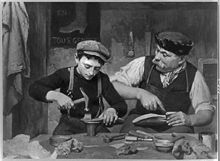学徒
实习工人
学徒是开始从事某种手艺活的实习者,通过给雇主当学徒,他们可以获得相应的就业凭证和经验,或者得到雇主续约。从学徒毕业的人就会成为熟练工人。其性质和现代更常见的实习生完全不同。不同地区不同时代的学徒期也不同,从三年至七年都有。旧式学徒通常会雇主之间形成一定的人身依附关系,甚而是一种地区性、家族渊源内荐式的封闭型技艺传承,绝非今天那种采纳工作经验、学历或正式社会身份而聘用的实习生。


历史
编辑欧洲学徒系统出现在中世纪晚期,受同业公会和当地政府的监督。一名手艺好的业内大师是学徒的雇主,他为学徒提供食宿和培训,以此换取廉价的劳动力。大多数的学徒都是男性,但像皮匠、裁缝师和面包师这样的职业中就会有女性学徒。[1][2]他们在十到十五岁时成为学徒,在完成七年左右的学徒合同之后就可能对此领域有相当的熟悉程度了,但要在业内占据一席之地或许还要经历熟练工时期并成立自己的作坊。
后来一些大学也开始使用学徒系统培训学者,根据亚当·斯密的说法,像研究生这样需要导师监督的学位原来就算是学徒的一种。另一方面,当时一些古老城镇会使用University of smiths(铁匠协会)、University of tailors(裁缝协会)等名称来指代这些行业工会组织。[3]
实际上学徒制这类机制是人类工艺传承的自然之举,根本无需多加追寻历史或证明,这是一种自然而然不证自明的社会工艺传承文化。直到今天无论是新进职员,又或是蓝领的学徒,仍旧带有传统色彩学徒文化,虽然现在的学徒与师傅的关系不再如同古代一样紧密,但仍只有少数依附于官僚体制的体制内工作可以做到比较与传统学徒文化断离的状况。
另见
编辑参考文献
编辑- ^ Apprenticeship indenture. Cambridge University Library Archives (Luard 179/9). March 18, 1642 [2015-01-08]. (原始内容存档于2019-05-21).
- ^ Apprenticeship indentures 1604 - 1697. Cambridge St Edward Parish Church archives (KP28/14/2). [2009-12-07]. (原始内容存档于2011-08-13).
- ^ Smith, Adam. Wealth of Nations: An Inquiry Into the Nature and Causes of The Wealth of Nations. London: W. Strahan and T. Cadell. 1776 [2015-01-08]. (原始内容存档于2015-01-08).
扩展阅读
编辑- Modern Apprenticeships: the way to work, The Report of the Modern Apprenticeship Advisory Committee, 2001 [1]
- Apprenticeship in the British "Training Market", Paul Ryan and Lorna Unwin, University of Cambridge and University of Leicester, 2001 [2](页面存档备份,存于互联网档案馆)
- Creating a ‘Modern Apprenticeship’: a critique of the UK’s multi-sector, social inclusion approach Alison Fuller and Lorna Unwin, 2003 (pdf)(页面存档备份,存于互联网档案馆)
- Apprenticeship systems in England and Germany: decline and survival. Thomas Deissinger in: Towards a history of vocational education and training (VET) in Europe in a comparative perspective, 2002 (pdf)
- European vocational training systems: the theoretical context of historical development. Wolf-Dietrich Greinert, 2002 in Towards a history of vocational education and training (VET) in Europe in a comparative perspective. (pdf)
- Apprenticeships in the UK- their design, development and implementation, Miranda E Pye, Keith C Pye, Dr Emma Wisby, Sector Skills Development Agency, 2004 (pdf)
- L’apprentissage a changé, c’est le moment d’y penser !, Ministère de l’emploi, du travail et de la cohésion sociale, 2005
- Learning on the Shop Floor: Historical Perspectives on Apprenticeship, Bert De Munck, Steven L. Kaplan, Hugo Soly. Berghahn Books, 2007. (Preview on Google books)(页面存档备份,存于互联网档案馆)
- "The social production of technical work: the case of British engineers" Peter Whalley, SUNY Press 1986.
- "Apprenticeship in the ‘golden age’: were youth transitions really smooth and unproblematic back then?", Sarah A.Vickerstaff, University of Kent, UK, 2003
- "The Higher Apprenticeship (HA) in Engineering Technology"; The Sector Skills Council for Science, Engineering and Manufacturing technologies, UK, 2008